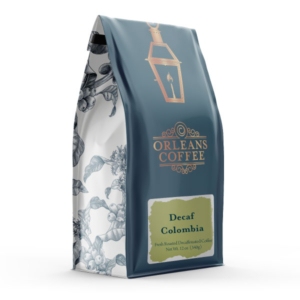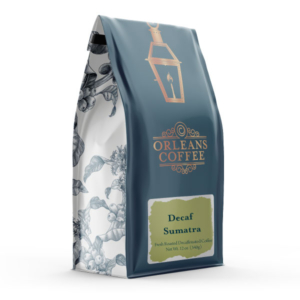5 Surprising Health Benefits of Decaf Coffee You Probably Didn’t Know
Decaf coffee is often overlooked, but it’s actually full of surprising health benefits. Many people think decaf is just regular coffee without the “kick,” but there’s more to it than that. For those who want to cut down on caffeine or avoid it altogether, decaf is a great choice. Whether you’re sensitive to caffeine, pregnant, or simply looking to enjoy coffee later in the day without affecting your sleep, decaf coffee can be a smart and tasty option.
One common question people ask is: Can decaffeinated coffee dehydrate you? We’ll answer that and explore five unexpected health benefits that may change how you see decaf. If you’ve ever wondered if making the switch is worth it, especially if you’re buying from a premium source like Orleans Coffee, where quality and flavor matter.
Key Takeaways
- Decaf coffee does not dehydrate you: It contains very little caffeine and can actually help contribute to your daily fluid intake.
- Decaf supports heart health: It may help lower blood pressure and improve circulation without the effects of caffeine.
- It reduces anxiety and improves sleep: Decaf is a great alternative for people sensitive to caffeine or those who enjoy coffee later in the day.
- It may lower the risk of type 2 diabetes: Compounds like chlorogenic acids in decaf can support better blood sugar control.
- Decaf is gentler on the stomach: It’s less acidic and can support gut health without causing digestive discomfort.
- Quality matters: Choosing decaf made through natural methods like the Swiss Water Process ensures better taste and health benefits.
What Exactly Is Decaf Coffee?
Decaf coffee is made from regular coffee beans that have had most of their caffeine removed. The goal is to keep the flavor and nutrients while reducing the caffeine. Most decaf still has a small amount of caffeine, about 2 to 5 milligrams per cup, compared to 70 to 140 milligrams in regular coffee.
How It’s Made

There are a few main ways to remove caffeine. The Swiss Water Process is a popular method that doesn’t use chemicals. It relies on water, temperature, and time to remove the caffeine while keeping the flavor. Another method uses carbon dioxide (CO₂) to draw out caffeine. Some cheaper decaf coffees use chemical solvents, but high-quality roasters like Orleans Coffee prefer natural, safe methods.
When done right, decaf coffee tastes just as rich and satisfying as regular coffee. You can still enjoy your favorite cup without the jitters or sleep issues.
-
 Decaf Creole Coffee & Chicory BlendPrice range: $14.95 through $38.75
Decaf Creole Coffee & Chicory BlendPrice range: $14.95 through $38.75 -
 Decaf Colombia CoffeePrice range: $15.50 through $40.00
Decaf Colombia CoffeePrice range: $15.50 through $40.00 -
 Decaf SumatraPrice range: $18.95 through $49.25
Decaf SumatraPrice range: $18.95 through $49.25
Can Decaffeinated Coffee Dehydrate You?
There’s a common myth that coffee causes dehydration. This is because caffeine can have a mild diuretic effect, which makes your body lose more water. But here’s the truth: decaf coffee has very little caffeine, so it does not cause the same effect.
In fact, decaf coffee can help you stay hydrated. Many health experts now agree that coffee, including decaf, counts toward your daily water intake. That’s good news for coffee lovers who are trying to drink more fluids without giving up their daily brew.
So, can decaffeinated coffee dehydrate you? The answer is no. Since the caffeine content is low, decaf coffee is unlikely to cause dehydration. Instead, it can be part of a healthy hydration routine. If you’re still worried, just pair it with a glass of water, but in most cases, it’s nothing to stress about.
1. Supports Heart Health
One surprising benefit of decaf coffee is its positive effect on heart health. While caffeine can raise blood pressure in some people, decaf coffee has been shown to have the opposite effect. Drinking decaf regularly may help reduce blood pressure and improve overall heart function, especially in people who are sensitive to caffeine.
Lowers Blood Pressure Risk
Several studies show that one of the benefits of decaf coffee is lower blood pressure, thanks to the antioxidants and other helpful compounds it contains. These antioxidants, especially chlorogenic acids, can improve the way blood flows in the body and reduce stress on blood vessels.
Antioxidants Still Present
Even though caffeine is removed, decaf still contains many of the antioxidants found in regular coffee. These include polyphenols and hydrocinnamic acids, which support healthy blood circulation and fight inflammation. That means you can enjoy the heart benefits of coffee, without the caffeine side effects.
2. Helps Reduce Anxiety and Improve Sleep
Many people love coffee but struggle with the side effects of caffeine, such as feeling anxious or not being able to sleep. That’s where decaf coffee shines. It lets you enjoy the taste and comfort of coffee without the stress.
Calm Your Nerves
Caffeine can make anxiety worse, especially for people who are already sensitive. It raises the heart rate and can cause nervous feelings. Switching to decaf can help reduce these symptoms, making you feel calmer and more in control. That’s why it’s a great choice for people dealing with stress or anxiety.
Sleep Better at Night
Caffeine stays in your system for hours and can mess with your sleep, even if you drink it in the afternoon. Decaf coffee is a better choice if you enjoy coffee in the evening. It won’t keep you up at night, so you can relax, enjoy your drink, and still get a good night’s sleep. With decaf, you don’t have to choose between your favorite drink and a restful night.
3. May Protect Against Type 2 Diabetes
Decaf coffee may also play a role in reducing the risk of type 2 diabetes. While caffeine can affect blood sugar levels in some people, decaf doesn’t seem to have the same effect.
Supports Better Blood Sugar Control
Studies have shown that certain compounds in decaf coffee, like chlorogenic acids, may improve how your body handles glucose. This can help with insulin sensitivity and make it easier to keep your blood sugar stable. If you’re watching your sugar levels, decaf can be a better option than regular coffee.
Safe for Daily Use
For people at risk of diabetes or those already managing it, decaf coffee offers a safer way to enjoy coffee regularly. You still get the health benefits without the caffeine spike that may affect glucose. It’s a gentle and smart choice that fits into a balanced diet.
4. Supports Liver Function
Your liver works hard to remove toxins and process nutrients. Decaf coffee can help keep it healthy, just like regular coffee, but without the caffeine.
Decaf and Liver Enzymes
Some studies show that people who drink decaf coffee regularly have better liver enzyme levels. These enzymes help your liver do its job well. By lowering inflammation and improving liver function, decaf may reduce the risk of liver diseases, including fatty liver disease.
Long-Term Benefits
The best part is that these benefits come from regular, long-term use. Drinking a cup or two of decaf daily can support your liver over time. If you want to protect your body’s natural filter without the effects of caffeine, decaf is a smart pick.
5. Good for Digestive and Gut Health
Regular coffee can be hard on the stomach. It’s acidic and may cause discomfort in some people. Another one of the benefits of decaf coffee is that it’s usually easier on the digestive system, making it a better option for those with sensitive stomachs.
Gentle on the Stomach
If you have acid reflux or indigestion, switching to decaf can help. It’s less acidic than regular coffee and won’t trigger the same symptoms. That means you can still enjoy a warm cup in the morning without worrying about stomach pain later.
Prebiotic Power
Some studies suggest that polyphenols in decaf coffee may help support healthy gut bacteria. These bacteria are important for digestion, immunity, and even mood. A healthy gut makes a big difference in how you feel every day, and decaf can play a small part in keeping it balanced.
-
 Decaf BrazilPrice range: $14.50 through $37.50
Decaf BrazilPrice range: $14.50 through $37.50 -
 Decaf Creole Coffee & Chicory BlendPrice range: $14.95 through $38.75
Decaf Creole Coffee & Chicory BlendPrice range: $14.95 through $38.75 -
 Decaf Colombia CoffeePrice range: $15.50 through $40.00
Decaf Colombia CoffeePrice range: $15.50 through $40.00
Who Should Consider Drinking Decaf Coffee?
Decaf coffee is perfect for people who love the taste of coffee but want to avoid caffeine. This includes:
- Pregnant women who are limiting caffeine intake.
- People with heart conditions or high blood pressure.
- Anyone who struggles with anxiety or sleep issues.
- Those who enjoy coffee late in the day or evening.
For people with caffeine sensitivity, decaf is a way to still enjoy coffee without the side effects. It’s also a good choice for people trying to drink more fluids without worrying about dehydration.
Final Verdict
Decaf coffee isn’t just a caffeine-free version of your favorite drink. The unique health benefits of decaf coffee make it worth trying. From supporting heart health and liver function to reducing anxiety and helping with digestion, decaf coffee is more than just a second choice.
And if you’re wondering again, can decaffeinated coffee dehydrate you? The answer is no. It helps with hydration and can even count toward your daily water intake. So, whether you’re cutting back on caffeine or just looking to enjoy a smooth, gentle cup of coffee, decaf is a healthy and satisfying option.
Try one of the delicious decaf blends from Orleans Coffee today and discover a better way to enjoy your daily brew.
Frequently Asked Questions (FAQs)
1. Does decaf coffee taste different from regular coffee?
Decaf coffee can taste slightly different from regular coffee, but high-quality decaf retains much of the original flavor. The taste may be milder or smoother since some compounds are removed during the decaffeination process. If you buy from a trusted roaster like Orleans Coffee, you can expect rich, full-bodied flavor even in decaf. Brewing method and freshness also play a big role in taste quality.
2. Is decaf coffee safe to drink every day?
Yes, decaffeinated coffee is safe to enjoy daily. In fact, many people drink it regularly to avoid the effects of caffeine while still getting antioxidants and other benefits of decaf coffee. It’s a good option for people with health conditions or those who want to reduce caffeine intake without giving up their coffee routine. Just like any food or drink, moderation is always a smart approach.
3. Can children or teens drink decaf coffee?
Decaf coffee is generally safer for children and teens than regular coffee because it contains much less caffeine. However, it’s still best to limit how often they drink it. Occasional decaf won’t usually cause harm, but it’s important to avoid developing a habit of relying on coffee at a young age. Always check with a healthcare provider if you have concerns about caffeine for kids.
4. Does decaf coffee lose its nutrients after caffeine is removed?
No, decaf coffee still keeps many of the same nutrients and antioxidants found in regular coffee. The decaffeination process removes most of the caffeine, but helpful compounds like polyphenols and chlorogenic acid remain. These nutrients contribute to the many health benefits of decaf coffee, including heart and liver support. Choosing a natural method like the Swiss Water Process helps retain even more of these nutrients.
5. How should I store decaf coffee to keep it fresh?
To keep your decaf coffee fresh, store it in an airtight container away from light, heat, and moisture. Keep it at room temperature in a cool, dry place, not in the fridge or freezer. For the best flavor, use whole beans and grind them just before brewing. Buying in smaller amounts and choosing freshly roasted decaf, like the ones from Orleans Coffee, also ensures better taste and aroma.
Back to Blog
